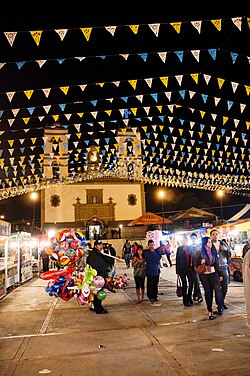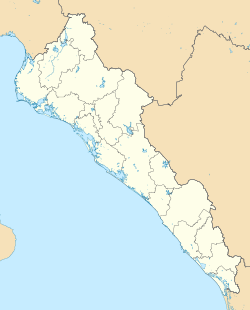Guasave (Spanish pronunciation: [ɡwaˈsaβe]) is a city and the seat of the homonymous municipality known as the Agricultural Heart of Mexico (El Corazon Agricola de Mexico) in the Mexican state of Sinaloa. It is located in the northwestern part of Mexico, 62km (38 miles) southeast of the city of Los Mochis and 150km (93 miles) northeast the state capital Culiacán. It stands at 25°34′04.5″N 108°28′10.8″W / 25.567917°N 108.469667°W.
Guasave, Sinaloa | |
|---|---|
 | |
| Nickname: The Agricultural Heart of Mexico | |
| Coordinates: 25°34′28″N 108°28′14″W / 25.57444°N 108.47056°W | |
| Country | |
| State | Sinaloa |
| Municipality | Guasave |
| Founded on | 24 June 1595 |
| Founded by | Hernando de Villafañe |
| Government | |
| • Mayor | Martin de Jesus Ahumada Quintero (National Regeneration Movement) |
| Elevation | 27 m (89 ft) |
| Population (2020) | |
• Total | 320,000 |
| [1] | |
| Time zone | UTC-7 (Mountain Standard Time) |
 | |
In the 2010 census, the city reported a population of 71,196, making it the fourth-largest community in the state, after Culiacán, Mazatlán, and Los Mochis. The municipality has a land area of 3,464.41 km2 (1,337.62 sq mi) and includes many other outlying communities, the largest of which are Juan José Ríos, Gabriel Leyva Solano, Adolfo Ruiz Cortines, El Burrion and Bamoa.
Transportation
editThe Mexican Highway Number 15 (Carretera Internacional Numero 15) passes through the city north to south direction. The city is served by Campo Cuatro Milpas Airport, offering air services within the region.
Tourist attractions
editSan Ignacio Bay and Navachiste Bay are popular for watersports. Guasave also features the viceroyalty towns as Tamazula, with its famous Franciscan era church. Nearby lie the ruins of Pueblo Viejo and Nío, which date from the time of the Jesuits from the 17th century until their expulsion in 1767. Visitors can also go to Parque Villafañe, a local park named after the city's founder.
Sports
editThe Algodoneros ("Cotton Growers") professional baseball team of the Mexican Pacific League are based in Guasave. The football team Diablos Azules de Guasave ("Blue Devils") is part of the soccer league Tercera División de México. The basketball team Los Frailes("The Friars") is a professional team who play in CIBAPAC.
Economy
editSituated on the Pacific Coastal Plains in Northwest Mexico and including within limits near than half million irrigated acres agriculture is the main economical activity by far. Aquaculture is other important industry.
The agro business related activities are also important.
Archaeology
editThe Guasave archaeological site, belonging to Capacha culture, was excavated by archaeologist Gordon Ekholm in the 1940s. It became known as the greatest formal cemetery mound in Northwest Mexico that has been excavated.[2]
He found several pottery types including red wares, red-on-buff, finely incised wares and several types of highly detailed polychrome pottery. Also, alabaster vases and copper implements were found. Cotton textiles were also used by these peoples.
Capacha culture goes back to 2000–1500 BC.
History
editThe Jesuit mission of San Pedro y Pablo de Guasave was founded in 1590.[3]
Notable people
edit- Diego Aguilar Acuña, politician, federal deputy and local deputy
- Gael Álvarez, footballer[4]
- Jesús Burgos Pinto, politician, federal deputy and former municipal president of Guasave[5]
- Manuel Cárdenas Fonseca, politician, federal deputy
- Florentino Castro López, politician, federal deputy[6]
- Arnoldo Castro, baseball player, member of the Mexican Professional Baseball Hall of Fame[7]
- Rodolfo Espinoza, footballer[8]
- Diva Hadamira Gastélum, politician, federal deputy
- Armando Leyson, politician, federal deputy and former municipal president of Guasave[9]
- Ángel López, footballer[10]
- Miguel Martínez, actor and singer[11]
- Julio César Pardini, footballer[12]
- Edson Reséndez, footballer[13]
- Mario Rodríguez, boxer, former IBF world champion[14]
- Blas Ramón Rubio Lara, politician, federal deputy
- Gilberto Sepúlveda, footballer[15]
- Remmy Valenzuela, singer-songwriter[16]
References
edit- ^ "Principales resultados por localidad 2010 (ITER)". Instituto Nacional de Estadística y Geografía. 2010.
- ^ Ekholm Archaeological Project in Sonora, Mexico - 2015, American Museum of Natural History
- ^ Polzer, Charles W. (18 October 2016). Rules and Precepts of the Jesuit Missions of Northwestern New Spain. University of Arizona Press. p. 33. ISBN 978-0-8165-3480-7.
- ^ Angeles, Alexis (27 February 2023). "Gael Álvarez el sinaloense que brillo en el Premundial con México". El Sol de Sinaloa (in Spanish). Retrieved 28 September 2024.
- ^ Moya Delgado, Octaviano (March 2013). "La élite política en Sinaloa: conformación y permanencia, 1950-2010". Intersticios sociales (in Spanish) (5). Autonomous University of Sinaloa. Retrieved 28 September 2024 – via SciELO.
Su hermano, Jesús Burgos Pinto nació el 3 de agosto de 1953 en Guasave.
- ^ "Florentino Castro López, nuevo delegado del CEN del PRI en Jalisco". El Informador (in Spanish). 24 November 2010. Retrieved 28 September 2024.
Castro López es oriundo de Guasave, Sinaloa...
- ^ "Muere Kiko Castro". Milenio (in Spanish). 16 December 2013. Retrieved 28 September 2024.
- ^ ""Renueva Rodolfo Espinoza contrato en Perú"". Periódico Noroeste (in Spanish). 7 November 2015. Retrieved 28 September 2024.
- ^ Moya Delgado, Octaviano (March 2013). "La élite política en Sinaloa: conformación y permanencia, 1950-2010". Intersticios sociales (in Spanish) (5). Autonomous University of Sinaloa. Retrieved 28 September 2024 – via SciELO.
Armando Leyson Castro nació el 28 de septiembre de 1956 en Guasave.
- ^ "'Estamos fuertes': Ángel López". El Imparcial (in Spanish). 11 September 2020. Retrieved 28 September 2024 – via PressReader.
- ^ Martínez, Fátima (31 July 2024). "¿Qué fue del actor Miguel Martínez, reconocido por Alebrijes y Rebujos?". El Siglo de Torreón (in Spanish). Retrieved 28 September 2024.
- ^ "El guasavense Julio Pardini es campeón en Costa Rica". Debate.com.mx (in Spanish). 22 May 2017. Retrieved 28 September 2024.
- ^ ""Guasavense de alto vuelo"". Periódico Noroeste (in Spanish). 14 November 2015. Retrieved 28 September 2024.
- ^ Rodríguez, Salvador (22 April 2020). "Dragoncito Rodríguez, excampeón mundial mexicano, sobrevive cortando cabello al no poder entrenar por Covid-19". ESPN Deportes (in Spanish). Retrieved 28 September 2024.
- ^ Rodríguez, Hugo (4 February 2024). "Gilberto Sepúlveda: El guasavense cumple 25 años de edad convertido en bastión de Chivas". Periódico Noroeste (in Spanish). Archived from the original on 6 February 2024. Retrieved 28 September 2024.
- ^ Maldonado Varela, Jorge (29 June 2019). "Remmy Valenzuela pone el ritmo en la Feria de Gómez Palacio". Milenio (in Spanish). Archived from the original on 7 April 2020. Retrieved 28 September 2024.
External links
edit- Ayuntamiento de Guasave Official website
- Todo sobre Guasave!
- Sinaloa Enciclopedia de los Municipios de México


